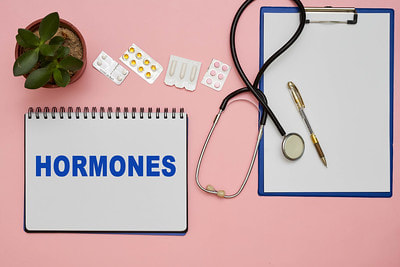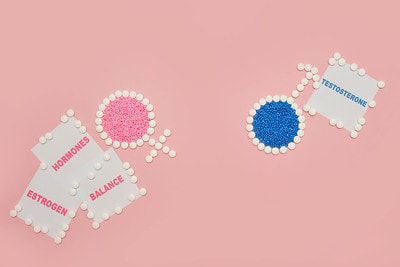|
(If you don't want to read anything about estrogen, progesterone, ovaries, vaginas, and uteruses - stop reading now and join me next time) I would like to share a series of messages geared towards education on health topics. This blog is open to everyone, so of course I am not diagnosing or treating any medical condition (ok, I think my malpractice lawyers are happy now). With that being said, I feel that there is a lot of information all people can and should have easy access to. Education, awareness, and some tools that anyone can learn about on their own. Female hormones... What exactly are we talking about here?First, a note on terminology. I used the phrase "female hormones" above so that anyone interested in this topic would know generally what I will be talking about. But with that being said, I prefer to use more accurate terminology such as "testes owners”, "ovary owners”, "vagina owners”, "uterus owners”, all just depending on the subject. The reason for this is that I want to give the right information to the right person (or those who know and love them). Many of my female patients have had a hysterectomy, so "uterus owner" information would not be relevant to them. The more specific the terminology, the more useful. Same thing with menstruating versus not menstruating. There are different priorities, hormone imbalances, and self-care ideas that will be relevant depending on one's menstruating status. That's why I use very specific phrasing, which may be new to you, but I don't think will be confusing to anyone. You only have to know what reproductive organs you have to follow along. Hormones at play So for today, I am going to focus on estrogen and progesterone. Everyone has all three sex hormones (estrogen, progesterone, and testosterone), but it's the estrogen and progesterone that are of particular importance for menstrual, peri- and postmenopausal concerns. Through the menstruating years, every menstrual cycle is a roller coaster of estrogen and progesterone. The estrogen typically peaks the week of and week after the menstrual period itself, then the progesterone peaks the two weeks following that (presuming a 28-day cycle where ovulation is happening). Menstrual concerns are varied. A top-of-my-head list includes long cycles, short cycles, no menstrual cycle appearing, spotting mid-cycle, bleeding mid-cycle, heavy cycles, clotting, cramps, breast tenderness, mood swings, insomnia, fatigue, anxiety, depression, constipation, and low back pain just to name a few. Menstrual cycles, and some appearance of physical and sensation changes, are completely normal. But when those hormone shifts are impacting one's quality of life... then that's time to get some professional support. Same with menopause. It is a natural stopping of the menstrual cycles (along with stopping ovulation) when those fluctuating hormone levels have come to rest at a level too low to trigger menstrual cycles and changes. For some, it's an easy, breezy transition. But for many, it can be a time that hormone shifts can again significantly impact quality of life. That can include hot flashes, night sweats, insomnia, fatigue, difficulty concentrating, memory issues or foggy headedness, anxiety, depression, joint pains, libido changes, vaginal dryness and/or discomfort. Long-term post-menopausal hormone deficiencies can also be a risk factor in the development of osteoarthritis, cardiovascular disease, dementia, and osteoporosis. There are a lot of factors that go into my initial investigation with new patients. But if some (or many!) of these concerns are present, we are often ordering lab testing. If insurance covers other testing ordered by me, such as blood sugar and thyroid tests, they cover hormone testing as well. The only insurances that don't cover lab testing by me are Medicaid plans, Medicare plans, and Kaiser. Regardless of hormone testing and test results, there are some common tips and tools that anyone can use at home to care for their hormones. Self-care for top concernsA hormone support plan often includes attention to nutrition, hydration, physical activity, sleep, and stress levels. I will dive into each of these topics. Nutrition building blocks for hormones include protein, fats, and fiber. Getting in enough protein daily ensures that your body can create and circulate proper hormone levels. Healthy fats (such as pastured meats, eggs, also coconut, avocado, and olive oil) are also important. Did you know that the backbone of every single hormone is a complex fat molecule? People who have low cholesterol are actually at a potential disadvantage as they may be at greater risk for hormone deficiencies. Fiber and hydration come up in particular for menstruating concerns. As the estrogen and progesterone alternately spikes then drops through the cycle, our bodies have to respond by increasing production (when one is supposed to be spiking) then increasing the breakdown (when it is supposed to be declining). Many hormonal imbalances have an estrogen dominant aspect to them. That is a big subject, but one important aspect is to help facilitate the breakdown of estrogen. That is where the fiber and hydration come into play. Both soluble and insoluble forms of fiber help in the body and specifically in the digestive system to help get out the hormone metabolites (waste products) when it is time for them to go. Dietary sources of fiber include nuts, seeds, vegetables - especially broccoli, cauliflower, kale, chard and salad greens. If you need a little fiber boost, adding one or two tablespoons of flaxseed meal into food is an easy way to do it. Everyone has different hydration needs, but generally an intake less than 48 oz of water daily will lead to constipation and more sluggish bowels (thus slower elimination of those hormone metabolites which can lead to them getting reabsorbed from the bowels). Sleep and stress reduction come into play as our restorative times are the times that encourage more production of progesterone, a naturally calming hormone. High stress levels provoke more production of cortisol. Cortisol, in appropriate levels, is the hormone that helps us wake up naturally. But in high levels it is often called "the stress hormone," and can be involved in long-term high-stress symptoms of insomnia, anxiety, heart palpitations, and more. Now I'm going to talk about vaginas. A lot.Everyone has had ample time to leave if this is not a topic for them. But for my vagina owners out there, this message is for you. A few vagina self-care tips: --- Don't stick anything in your vagina to clean it or get rid of an infection. Seriously. If you think you have an infection, seek care from the provider who does your pap exams so you can be tested for an infection. Don't treat it yourself (don't google herbs and start sticking them up there!). I have seen what effectively was a vaginal chemical burn, caused by insertion of food/herb items that could be picked up at a grocery store. Don't do it. Vaginas are the original self-cleaning oven. Yes, I'm joking. But in all seriousness, they don't need cleaning inside. --- If you are prone to recurrent UTIs or vaginal infections (or dysbiosis such as BV), then you probably know that you have to take extra vaginal/ vulvar care precautions. Wearing cotton underwear, showering immediately after exercise, cleaning/ showering after sexual intercourse (with partners and/or toys), being very careful with soaps and lotions, wiping front to back with toilet paper and maybe even buying bleach-free toilet paper. If you still find yourself very sensitive to recurrent infections or dysbiosis, talk with your provider(s) about what test treatment steps may be available for you. --- Use lubricant. If you have a vagina, and you engage in any type of sexual activity that involves said vagina, just do it. Use lube. Yes, all vagina owners. Yes, even if you don't experience any type of vaginal dryness or discomfort ever. Yes, still use it. Using silicone lubricant helps keep vaginal tissue healthy. It lowers the risk and rate of vaginal infections (and dysbiosis). It protects vaginal tissue during sexual activity and keeps it plump and intact. It provides a barrier that helps those who do experience vaginal dryness, discomfort, and pain. It is good for all vaginas. If you prefer using a water-based or oil-based lubricant, go right ahead. Any lubricant is better than none. --- More on vaginal dryness: It is very common around menopause. It can start before, during, or after the transition of periods stopping. If it is minor, and occasional, and silicone lubricant just isn't doing enough, you may want to look into hydration pearls (Bezwecken is one such manufacturer). When we do need to step up the plan into hormone replacement territory, vaginal cream is a very common format I am using. It is terrific (and fast acting) to reverse vaginal dryness, but it actually works great for all manner of peri- and postmenopausal-related hormone deficiencies. This is because applying hormones to vaginal tissue is the #1 way to get a slow and steady daily dose from a hormone prescription. When should you reach out?Whenever you need more support, of course. I am here to investigate and offer treatment solutions when what you have been doing previously isn't working, or isn't sufficient. Or when the plan had been working great, but now is not working out so well. Or when you have been told that it's pointless to check your hormones or nothing can be done because, "it's normal for women, normal for your age," or some such aggravating and useless sentiment. When you need things checked into, I am here. When you need to talk hormone prescriptions, I am here. I prescribe several forms of hormonal birth control (pretty much every type of prescription contraceptives except IUDs) and the options for prescription hormone supplementation are extensive. I always want to do my best to match each person up to the hormone type, format, and dosage that is right for them. Sometimes that takes a few tweaks early on, but I don't rest until the hormone replacement plan is working, and working wonderfully. I also want to do my best in terms of monitoring and providing the most effective treatment at the lowest potential for side effects, which includes hormone lab testing. If you would like to learn more about the history of hormone replacement therapy research, and why it seems there is so much disagreement out there in the medical community about hormones and hormone replacement, I suggest you read Estrogen Matters by Dr. Avrum Bluming. He is a breast cancer oncologist who really clearly communicates the research findings, and what actual health risks there are to hormone replacement (versus potential hormone deficiencies). OK, that's all I have for todayI hope that this has been helpful for those experiencing menstrual, menopausal, and vaginal concerns. Or those who know someone who could use this info, in which case please pass it on!
And next time, we will be talking all about testes and penises and testosterone, so now you've been forewarned. I hope we all get to see a little sun this weekend, Dr. Angela Cortal
0 Comments
Leave a Reply. |
Archives
June 2024
Categories
All
|
about the doc |
patient infocontact |
|
Privacy Policy
© Copyright 2011-2024, Dr. Angela Cortal ND LLC website content is for educational purposes only and is no substitute for medical advice (see the Terms of Use Agreement for this site), you must establish a doctor-patient relationship to receive that! |



